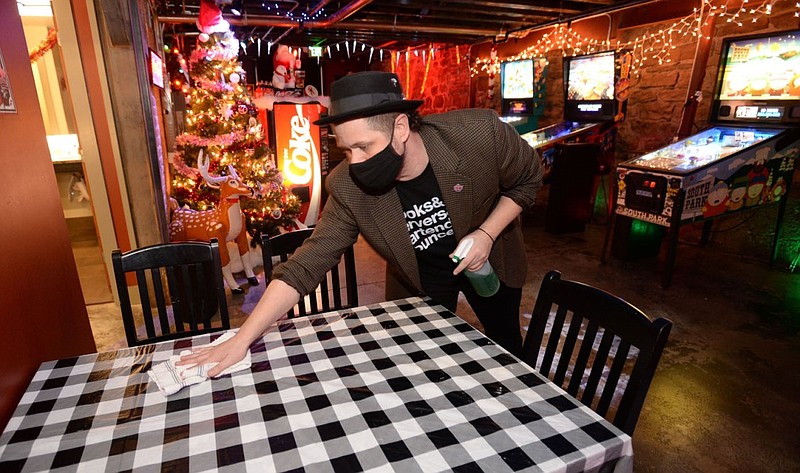Protecting public health outweighs the financial interests of Arkansas nightclub owners, Pulaski County Circuit Judge Wendell Griffen ruled Tuesday as he booted a challenge to an 11 p.m. curfew imposed on the state's liquor-serving establishments.
A consortium of about two dozen bars and restaurants in the Fayetteville area, all licensed to operate until 2 a.m., sued to overturn the curfew imposed in November by state Health Secretary Jose Romero.
The club owners complained that being forced to close as much as three hours early was killing their business by hitting them during peak operating hours while doing little to achieve the curfew's goal of reducing the spread of the covid-19 virus.
They also questioned why authorities had not imposed similar restrictions on churches and schools and particularly on casinos, which can sell drinks until 5 a.m.
Romero's order expires Feb. 3, about a week away, unless it's extended. During a state of emergency -- which Gov. Asa Hutchinson declared on March 11, 2020 -- the health secretary has the authority to issue regulations on commerce as necessary to prevent the spread of infection across the state, Griffen stated.
"There is no fundamental unfairness associated with a public health order that governs the closing time for bars and restaurants. [Club owners] have not suffered the 'taking' of their property," the judge wrote in his 16-page ruling. "Their business revenue has suffered during the pandemic, but that result -- including the requirement that bars and restaurants close at 11 p.m. -- plainly does not constitute irreparable injury."
The judge noted that more than 410,000 people in the United States, among them more than 4,600 Arkansas residents, have died from the pandemic in less than a year.
"There is a rational basis in the early closure and its legitimate governmental purpose of reducing the spread of covid-19 during bar 'peak hours,' " Griffen's ruling states.
Griffen's decision means the club owners will have to turn to the Arkansas Supreme Court if they want to overturn the curfew.
B.C. Pickett, a Fayetteville attorney who represents the club owners, said Tuesday afternoon they were considering whether to move forward with an appeal.
"As you can imagine, today was disheartening for every petitioner of this case," Pickett said in an email. "They are all small business owners who have been singled out and regulated beyond belief and normal standards. They are currently the only industry that has a regulation on when and how they can operate."
Griffen rejected the club owners' claims after gaining concessions from another of the group's attorneys, Gary Barrett of Little Rock, that being licensed to sell alcohol is a privilege, not a right, and that regulators are already empowered to control the operating hours and customer occupancy rates of license holders.
According to the judge, siding with the club operators would require that he recognize they have a constitutional right to make a profit, something no court has ever done.
Instead, Griffen agreed with lawyers from the Arkansas attorney general's office, Brittany Edwards and Michael Mosley, who said the curfew order is a valid effort to protect public health.
The curfew's goal is to restrict opportunities for people to congregate and potentially spread infection, and all it needs to do to be legal is to be a good idea, they told the judge.
The government has a duty to protect public health, and its authority to do so has been recognized by the courts for more than 100 years, they said. Furthermore, Griffen, in another case, already ruled in October that Hutchinson has been empowered by the General Assembly to combat emergency health threats like the coronavirus pandemic, the assistant attorneys general argued.
The club group had sued Hutchinson, whose executive authority empowered Romero to set the curfew and gave Doralee Chandler, director of Alcoholic Beverage Control, the power to enforce sanctions for violating the early-closure order.
The Arkansas Supreme Court is already preparing to hear an appeal of Griffen's October decision to reject a lawsuit challenging the governor's authority by a group of Republican legislators.
Hutchinson said he was glad Griffen came to the decision that he did Tuesday.
"Obviously I understand that the bar owners have a challenge whenever you have a curfew at 11 p.m.," the governor said. But, he added, "You can see from the cases that it's been necessary."
Pickett said club owners still believe the curfew is an infringement on their rights to operate a business without government interference.
"We respect the rule of law and the judge's ruling even if we do not agree," Pickett said in the email. "We hope that the people of Arkansas continue to speak up and stand for what's right in this difficult moment our state and nation is facing."
Hutchinson said whether the curfew will be extended beyond the Feb. 3 expiration date "remains to be seen."
"We'll continue to watch that," he said.
Information for this article was contributed by Bill Bowden and Andy Davis of the Arkansas Democrat-Gazette.

